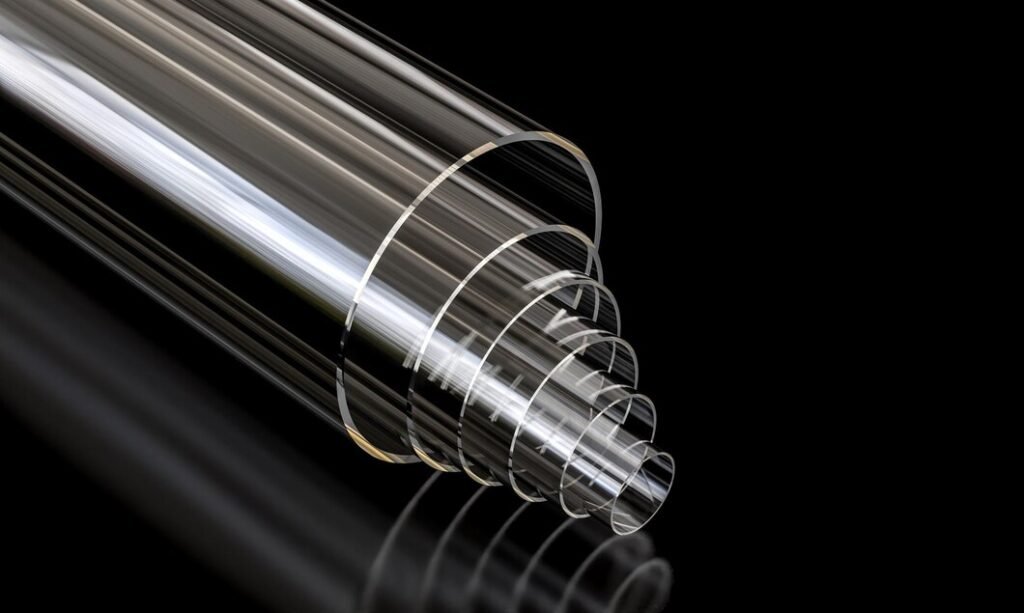Introduction
Acrylic pipes are increasingly popular across industries due to their transparency, durability, and versatility. Whether it’s for aquarium tanks, water fountains, or industrial fluid systems, knowing the specifications of acrylic pipes is crucial for proper installation and long-term performance. In this guide, we’ll explore everything you need to know about acrylic pipe specifications, including diameters, wall thickness, UV resistance, chemical resistance, and more.
1. Acrylic Pipe Diameters
Acrylic pipes are available in a variety of diameters to suit different applications:
- Acrylic pipe with 2-inch diameter: Ideal for small water features, aquaponics systems, and home irrigation lines.
- Acrylic pipe with 6-inch diameter: Suitable for industrial fluid transport, large aquarium tanks, and greenhouse circulation systems.
Choosing the correct diameter ensures optimal fluid flow and pressure management.
2. Wall Thickness and Strength
The wall thickness of an acrylic pipe determines its durability and resistance to pressure:
- Acrylic pipe with high wall thickness: Perfect for high-pressure applications, industrial piping, and heavy-duty fluid handling.
- Clear acrylic pipe for high pressure: Transparent pipes with reinforced walls allow visual monitoring without compromising strength.
A thicker wall generally provides higher mechanical strength and longer service life.
3. UV and Chemical Resistance
Acrylic pipes are often exposed to sunlight or chemicals, requiring special coatings:
- Acrylic pipe with UV-resistant coating: Prevents yellowing and degradation under prolonged sunlight exposure.
- Clear acrylic pipe with chemical resistance: Suitable for laboratories and industrial setups handling corrosive fluids.
These specifications are critical when pipes are used in outdoor environments or chemical transport.
4. Custom Lengths and Flexibility
Acrylic pipes can be customized to meet unique project requirements:
- Acrylic pipe with custom lengths: Provides flexibility for specific installations in aquariums, fountains, or industrial systems.
- Flexible acrylic pipe for bending applications: Allows smooth curves and customized layouts without compromising structural integrity.
Custom fabrication ensures that your system fits perfectly without unnecessary joints or connectors.
5. Heavy-Duty Industrial Applications
Some projects demand robust, industrial-grade acrylic piping:
- Heavy-duty acrylic pipe for industrial use: Designed to withstand high pressures, temperature variations, and mechanical stress.
- Transparent acrylic pipe for visibility applications: Allows operators to monitor fluid flow visually, preventing blockages and leakage.
Industrial acrylic pipes combine strength, transparency, and corrosion resistance, making them ideal for factories and chemical plants.
6. How to Choose the Right Acrylic Pipe Specification
When selecting an acrylic pipe, consider the following factors:
- Application Type: Aquarium, industrial, decorative, or irrigation.
- Diameter & Wall Thickness: Ensure flow rate and strength requirements are met.
- Environmental Exposure: Check for UV and chemical resistance.
- Custom Needs: Length, flexibility, and fittings.
Choosing the correct specifications will enhance performance, safety, and longevity.
Conclusion
Acrylic pipe specifications vary widely, from diameter and wall thickness to UV resistance and chemical durability. Understanding these specifications is essential for selecting the right pipe for your project.
Whether you need high-pressure clear acrylic pipes for industrial setups or custom-length transparent pipes for decorative fountains, choosing the correct specifications ensures optimal performance, safety, and longevity.

Looking for Interior-Grade Acrylic Pipes?
Explore our wide range of custom acrylic pipes designed to meet all your industrial and decorative needs. Contact Us Today to find the perfect acrylic pipe for your project!

